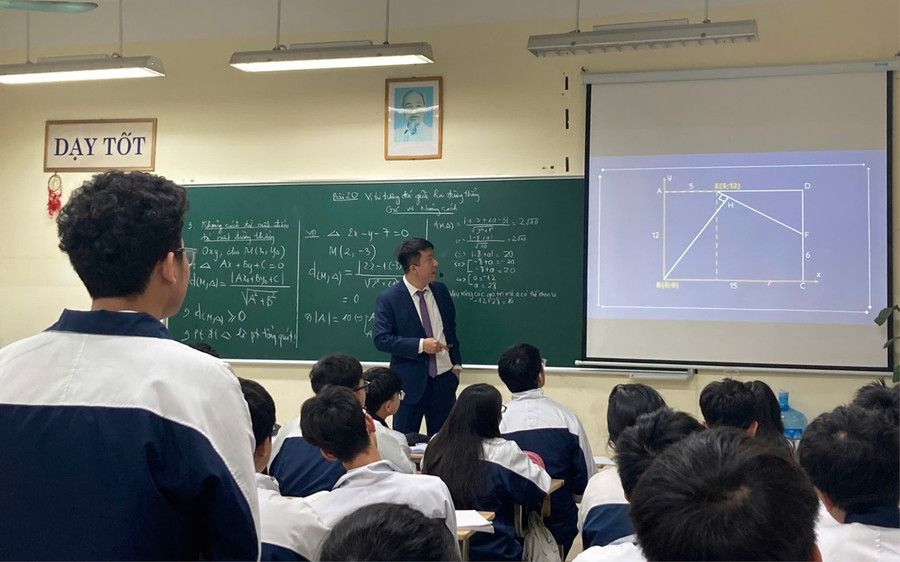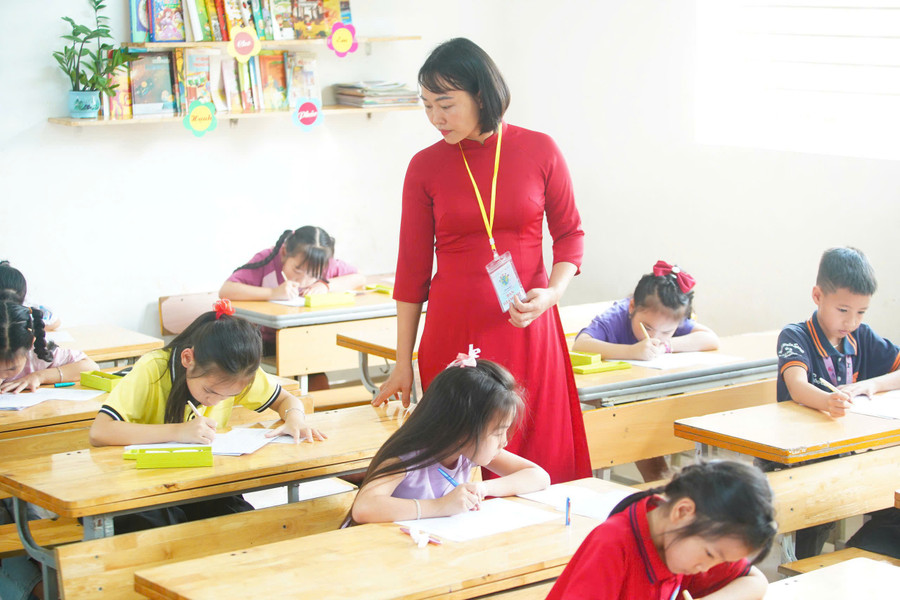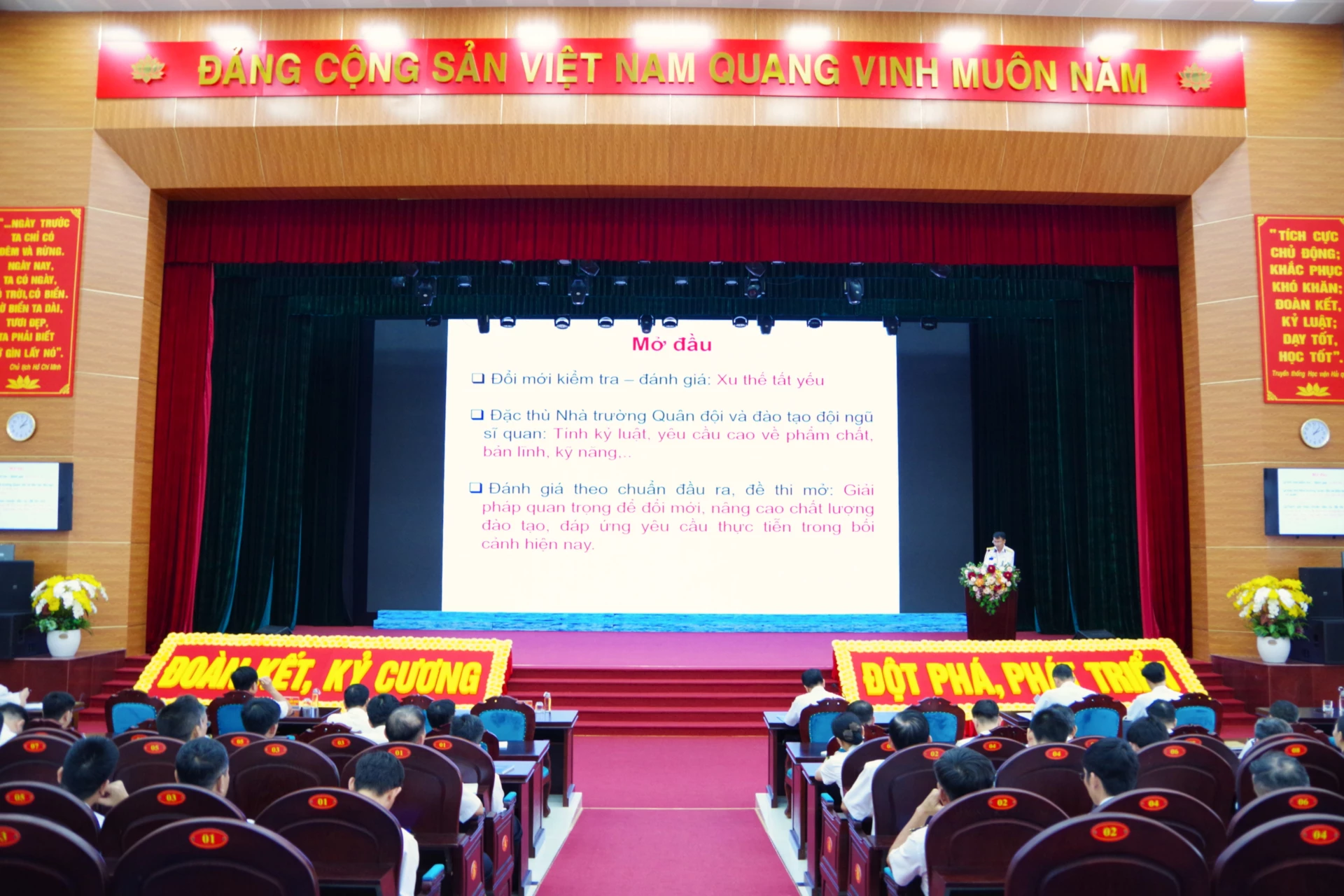Standardize and develop the team
The Law on Teachers was passed by the National Assembly and will take effect from January 1, 2026. Mr. Vu Minh Duc - Director of the Department of Teachers and Educational Managers ( Ministry of Education and Training ) emphasized that the key goal of the Law on Teachers is to develop the teaching staff, ensure the quality of education and build a strong education system. The Law aims to institutionalize the Party and State's policies on the role and position of teachers, while creating a legal corridor to attract, employ, develop and protect teachers.
Referring to the issue of standardization and development of the team - improving the quality of education , Mr. Vu Minh Duc shared that the Law on Teachers merges two systems of standards (professional titles and professional standards) into a common system of professional standards for teachers, applied uniformly to both public and non-public teachers. Professional standards for teachers are used in recruitment, placement, evaluation, training, and fostering of teachers; building and implementing policies for developing the teaching staff.
“This regulation is to ensure the standardization of the teaching staff in public and non-public educational institutions, ensure a common level of quality of the staff, create equal opportunities for promotion and career development of teachers in all types of educational institutions,” Mr. Vu Minh Duc emphasized, at the same time affirming that the important position of teachers in society includes: Public and non-public teachers, which is determined to ensure that all teachers are respected, protected and honored.
According to the Director of the Department of Teachers and Educational Managers, teachers are “special officials” and “special workers” who are guaranteed rights in professional activities commensurate with their position; including the right to be respected and have their reputation, honor, and dignity protected; at the same time, they must fulfill obligations worthy of the noble title of “teacher”; including the obligation to maintain the qualities, reputation, honor, dignity, and ethics of teachers, to be exemplary, to set an example in professional activities and social relations.
“The Law on Teachers stipulates what organizations and individuals are not allowed to do to teachers, stipulates how to handle violations of the reputation, honor and dignity of teachers, and especially strictly handles such acts if they occur within educational institutions or when teachers carry out professional activities to protect the honor and reputation of the teaching profession,” Mr. Vu Minh Duc emphasized.

Motivation to attract good students into the teaching profession
The Law on Teachers has become a great motivation for students studying and training at pedagogical schools to strive for a long time and stick with the education and training career of the country, Associate Professor, Dr. Nguyen Duc Son - Rector of Hanoi National University of Education acknowledged. From here, students will see their careers clearly defined, their future stable, and their jobs more respected. On that basis, many students with capacity and qualities will want to become teachers.
According to Associate Professor Dr. Nguyen Duc Son, the Law on Teachers has important factors that determine the quality of the team, which are honoring, ensuring life, and empowering and developing the team. This is not only a law but also an important basis for pedagogical schools to build and develop programs, implement training activities, and standardize the team. With this law, the team of teachers will be increasingly standardized, professional, and fulfill the responsibility of "growing people" assigned by the Party and the State.
Affirming that the promulgation of the Law on Teachers is a great success, Ms. Nguyen Thi Mai Hoa - Vice Chairwoman of the National Assembly's Committee on Culture and Society said that to put the Law into practice soon and promote its effectiveness and value in practice will be a big challenge; requiring high determination.
This is not only about propaganda and building documents to guide implementation, but more importantly, there must be practical assessments and timely adjustments so that the most appropriate policies can reach teachers. Thereby, teachers can develop their careers and maximize their roles, responsibilities, and contributions to the country's education.
The Law on Teachers takes effect on January 1, 2026. Deputy Minister of Education and Training Pham Ngoc Thuong said that from now until the end of 2025, the Ministry of Education and Training must simultaneously advise, research and issue 3 Decrees and 12 Circulars guiding its implementation.
These are important, difficult and complicated documents, so those who draft the guidance documents must approach them on the basis of closely following and fully adhering to legal bases, political viewpoints, science and practice with a high sense of responsibility, working scientifically and most practically.

5 policy groups to bring the Law into life
Associate Professor Dr. Pham Manh Ha - Faculty of Science and Technology of Education (Hanoi University of Science and Technology) acknowledged that the Law on Teachers is a historic step forward. However, for the Law to truly come into effect, the guiding documents need to focus on capacity building and building a comprehensive ecosystem to support teachers' development.
Accordingly, Associate Professor Dr. Pham Manh Ha proposed a number of specific policy groups, drawn from practice and extensive research results at higher education institutions. Firstly, training and capacity development policies: Building a team ready for Digital Transformation. Clearly stipulated in circulars on professional standards for teachers and staff; in which clearly defining standards on digital capacity standards and the ability to apply artificial intelligence (AI) is a mandatory requirement;
At the same time, develop training content in regular training programs for all education personnel, including lecturers and support staff. Along with that, there should be a minimum training level (for example: 20-30 hours/year) and establish a close cooperation mechanism with technology enterprises.
Associate Professor, Dr. Pham Manh Ha said that this policy will create a real push for the education sector to catch up with the trend of the National Strategy on AI and Decision No. 89/QD-TTg of the Prime Minister: Approving the Project to Improve the capacity of lecturers and managers of higher education institutions to meet the requirements of comprehensive fundamental innovation in education and training in the period 2019 - 2030.
“Currently, programs like “Train the Trainers” at Hanoi University of Science and Technology are highly effective, but they need to be replicated nationwide,” Associate Professor, Dr. Pham Manh Ha suggested.
Second, assessment policy and career roadmap: Innovation to recognize real contributions. To make Article 22 of the Law on Teachers a reality, Associate Professor, Dr. Pham Manh Ha proposed that the Ministry of Education and Training take the lead in developing a practical and flexible performance assessment framework, focusing on innovation and practical contributions, instead of relying solely on seniority or administrative indicators.
This framework should be applied consistently to support staff, in order to create a fair and transparent development roadmap. A more flexible and special promotion mechanism should be considered for individuals with outstanding achievements.
The report shows that the regulation on the time to retain the rank is too long and rigid, which can reduce the motivation of young and talented lecturers. Therefore, Associate Professor Dr. Pham Manh Ha believes that a flexible evaluation framework will promote a culture of responsibility and properly recognize dedication, in line with the spirit of international recommendations on professional development of teachers from UNESCO.
Third, policies on remuneration and talent attraction: Solving the "bottleneck" in salary. To effectively implement Article 24 of the Law on Teachers, Associate Professor, Dr. Pham Manh Ha recommends that the guiding document should specify the arrangement of teachers' salaries at the highest level in the administrative and career salary scale system, while specifying support policies such as public housing, travel support and special allowances for positions with high professional requirements such as psychologists, data management specialists, and teachers working in disadvantaged areas.
The current situation report affirms that low wages are the biggest “bottleneck”, causing brain drain. According to Associate Professor, Dr. Pham Manh Ha, the regulation on “highest salary” and support policies such as public housing and travel support in Clause 2, Article 24 of the 2025 Law on Teachers are expected to be strong levers to solve this problem, but need to be specified with a new truly competitive salary table and clear support measures.
Fourth, teacher protection and mental health support policies: Safety for creativity. The Circular on teacher ethics should consider designing a number of articles or chapters regulating the content of honor protection and media crisis handling procedures for teachers, along with a mandatory policy framework on mental health support in educational institutions.
The current situation report shows that positions such as: Psychological consultant, although increasingly important, have not been widely deployed. Protecting teachers not only strengthens their position but also creates a safe and happy working environment, in line with the humanistic spirit emphasized in Article 35 of the Law on Teachers.
Fifth, international integration and interdisciplinary cooperation policy: Creating an open ecosystem. Associate Professor, Dr. Pham Manh Ha recommends that the Ministry of Education and Training soon issue specific guidelines on international academic exchange and management programs, directly linked to UNESCO initiatives.
In particular, a legal framework is needed to encourage cooperation models between universities and technology enterprises, in order to effectively implement the national AI strategy and the inter-ministerial coordination mechanism under Article 38, Clause 2 of the Law on Teachers. Development cannot take place in isolation. Giving teachers strong autonomy in international cooperation needs to be supported by specific mechanisms to turn policies into actions.
The Law on Teachers passed by the National Assembly meets the expectations of more than 1 million teachers and education managers nationwide. Deputy Minister of Education and Training Pham Ngoc Thuong said that during the implementation process, when necessary, the law will continue to be amended and supplemented to better complete it, meeting the goal of developing the teaching staff - an important force that determines the quality of education and training.
Source: https://giaoducthoidai.vn/nang-cao-chat-luong-doi-ngu-nha-giao-yeu-to-then-chot-doi-moi-giao-duc-post743451.html




























![[Photo] An Phu intersection project connecting Ho Chi Minh City-Long Thanh-Dau Giay expressway behind schedule](https://vstatic.vietnam.vn/vietnam/resource/IMAGE/2025/8/21/1ad80e9dd8944150bb72e6c49ecc7e08)



































![[Photo] Politburo works with the Standing Committee of Hanoi Party Committee and Ho Chi Minh City Party Committee](https://vstatic.vietnam.vn/vietnam/resource/IMAGE/2025/8/21/4f3460337a6045e7847d50d38704355d)

































Comment (0)